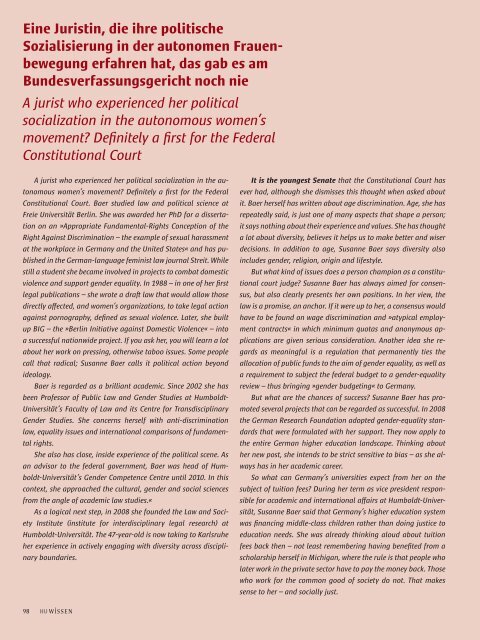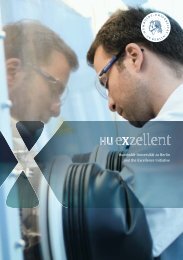hu wissen (pdf) - Exzellenzinitiative - Humboldt-Universität zu Berlin
hu wissen (pdf) - Exzellenzinitiative - Humboldt-Universität zu Berlin
hu wissen (pdf) - Exzellenzinitiative - Humboldt-Universität zu Berlin
Erfolgreiche ePaper selbst erstellen
Machen Sie aus Ihren PDF Publikationen ein blätterbares Flipbook mit unserer einzigartigen Google optimierten e-Paper Software.
Eine Juristin, die ihre politische<br />
Sozialisierung in der autonomen Frauenbewegung<br />
erfahren hat, das gab es am<br />
Bundesverfassungs gericht noch nie<br />
A jurist who experienced her political<br />
socialization in the autonomous women’s<br />
movement? Defi nitely a fi rst for the Federal<br />
Constitutional Court<br />
A jurist who experienced her political socialization in the autonomous<br />
women’s movement? Defi nitely a fi rst for the Federal<br />
Constitutional Court. Baer studied law and political science at<br />
Freie <strong>Universität</strong> <strong>Berlin</strong>. She was awarded her PhD for a dissertation<br />
on an »Appropriate Fundamental-Rights Conception of the<br />
Right Against Discrimination – the example of sexual harassment<br />
at the workplace in Germany and the United States« and has published<br />
in the German-language feminist law journal Streit. While<br />
still a student she became involved in projects to combat domestic<br />
violence and support gender equality. In 1988 – in one of her fi rst<br />
legal publications – she wrote a dra� law that would allow those<br />
directly aff ected, and women’s organizations, to take legal action<br />
against pornography, defi ned as sexual violence. Later, she built<br />
up BIG – the »<strong>Berlin</strong> Initiative against Domestic Violence« – into<br />
a successful nationwide project. If you ask her, you will learn a lot<br />
about her work on pressing, otherwise taboo issues. Some people<br />
call that radical; Susanne Baer calls it political action beyond<br />
ideology.<br />
Baer is regarded as a brilliant academic. Since 2002 she has<br />
been Professor of Public Law and Gender Studies at <strong>Humboldt</strong>-<br />
<strong>Universität</strong>’s Faculty of Law and its Centre for Transdisciplinary<br />
Gender Studies. She concerns herself with anti-discrimination<br />
law, equality issues and international comparisons of fundamental<br />
rights.<br />
She also has close, inside experience of the political scene. As<br />
an advisor to the federal government, Baer was head of <strong>Humboldt</strong>-<strong>Universität</strong>’s<br />
Gender Competence Centre until 2010. In this<br />
context, she approached the cultural, gender and social sciences<br />
from the angle of academic law studies.«<br />
As a logical next step, in 2008 she founded the Law and Society<br />
Institute (institute for interdisciplinary legal research) at<br />
<strong>Humboldt</strong>-<strong>Universität</strong>. The 47-year-old is now taking to Karlsruhe<br />
her experience in actively engaging with diversity across disciplinary<br />
boundaries.<br />
98<br />
It is the youngest Senate that the Constitutional Court has<br />
ever had, although she dismisses this thought when asked about<br />
it. Baer herself has written about age discrimination. Age, she has<br />
repeatedly said, is just one of many aspects that shape a person;<br />
it says nothing about their experience and values. She has thought<br />
a lot about diversity, believes it helps us to make better and wiser<br />
decisions. In addition to age, Susanne Baer says diversity also<br />
includes gender, religion, origin and lifestyle.<br />
But what kind of issues does a person champion as a constitutional<br />
court judge? Susanne Baer has always aimed for consensus,<br />
but also clearly presents her own positions. In her view, the<br />
law is a promise, an anchor. If it were up to her, a consensus would<br />
have to be found on wage discrimination and »atypical employment<br />
contracts« in which minimum quotas and anonymous applications<br />
are given serious consideration. Another idea she regards<br />
as meaningful is a regulation that permanently ties the<br />
allocation of public funds to the aim of gender equality, as well as<br />
a requirement to subject the federal budget to a gender-equality<br />
review – t<strong>hu</strong>s bringing »gender budgeting« to Germany.<br />
But what are the chances of success? Susanne Baer has promoted<br />
several projects that can be regarded as successful. In 2008<br />
the German Research Foundation adopted gender-equality standards<br />
that were formulated with her support. They now apply to<br />
the entire German higher education landscape. Thinking about<br />
her new post, she intends to be strict sensitive to bias – as she always<br />
has in her academic career.<br />
So what can Germany’s universities expect from her on the<br />
subject of tuition fees? During her term as vice president responsible<br />
for academic and international aff airs at <strong>Humboldt</strong>-<strong>Universität</strong>,<br />
Susanne Baer said that Germany’s higher education system<br />
was fi nancing middle-class children rather than doing justice to<br />
education needs. She was already thinking aloud about tuition<br />
fees back then – not least remembering having benefi ted from a<br />
scholarship herself in Michigan, where the rule is that people who<br />
later work in the private sector have to pay the money back. Those<br />
who work for the common good of society do not. That makes<br />
sense to her – and socially just.



